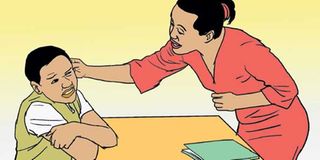Dealing with child abuse at preschool

What you need to know:
- Parents should take time to talk to their children about their day to get feedback of what happened.
Three-year-old *Stacey attends a preschool in Dar es Salaam. According to her mother *Helen, the child one day reported to the parents that one school worker pulled her ears and a teacher pinched her. Helen then decided to take the issue with the school administration who dismissed the claims saying young children “make up stories”.
Helen talked to some parents who also explained that their children have faced abuse in preschools. The parents however seemed to agree on one thing, “no school usually accepts that a child has been ill-treated.”
“It seems they always want to protect their businesses at the expense of our preschoolers who sadly enough are too young to even articulate everything that happens to them,” *Lucy a parent who lives in Mbezi said adding that many parents don’t approach the school management fearing their children would be isolated.
Sakina Dossaji, an educator and parent from Tanga is of the view that children thrive in love, comfort and security. She points out that once their peace of mind is disturbed, they cannot behave normally as they are unable to wear a mask over their emotions.
“They are as crystal clear as they can be. Some rush home and burst into tears narrating the scene, which occurred at school. Some withdraw in silence, refusing to eat or play, their normal routine disturbed by the invading thoughts and the fear of its recurrence. Children can never pretend or lie,” states Ms Dosaji.
She has some advice for teachers; “As a caretaker and educator, mental and emotional abuse should not happen in the first place. Children have been entrusted in your care in the hope that they are in safe hands. The first early years of children are very crucial and significant; anything untoward can leave a psychological effect in their lives which can hamper their emotional growth,” she emphasizes.
Ms Dosaji advises that once a parent discovers that the child has been a victim of physical or emotional abuse at the preschool, the first step is to remain calm.
“Sometimes the first instinct is outrage, with urgency to storm into the principal’s office to demand for an explanation. But that is a mistake many resort to. The child needs the parent to work with the school to help her respect, reflect and repair,” she advises, adding that the parent should calmly ask the principal to explain the school’s disciplinary measures with cases as such.
Maria Montessori says, “children are human beings to whom respect is due, superior to us by reason of their innocence and of the greater possibilities of their future.”
“Let us not forget, all successes begin with self-discipline. Just as doctors make an oath, educators must take a vow to treat children with love. A teacher can make or break a child, always be gentle and focus on your motto, “progress is life,” “knowledge is power.” Nelly Mwanyika, a teacher at Good Samaritan English Medium School in Dar es Salaam opines that the first step for a parent is to go to the school and find out what exactly happened. She says effective communication between parents and teachers is the best way to resolve such matters.
“The teacher, parent and the child need to maintain a positive attitude at all times but in the case that the abuse is bad and the school is not ready to resolve it, then there are laws that protect children even at school so the parent can report the matter to the authorities,” she suggests.
According to Jesephine Ferla, an Early Childhood Development expert at Elizabeth Glaser Pediatric AIDS Foundation in Dar es Salaam, parents need to create the culture of talking and interacting with their children from the time they are still in the womb.
“This is because it not only helps with bonding and attachment between a parent and the child; but also helps in terms of trust and understanding of the child’s cues and body language when they get older.” She points says a parent who knows his/her child well will know when the child is lying and not; happy or not; nervous or not. “And actually not many children of this age lie; most of times they are telling the truth. If communication is already part of everyday lifestyle, the child can communicate with parents about anything,” she states.
Ms Ferla says children need to learn about a right and wrong way someone can handle them, as it is very important when it comes to sexual abuse. “In case a child is physically assaulted at preschool, a parent who knows his/her child well needs to confidently speak to the management that the child has been pinched or slapped,” she advises.
Other signs which may help parents know that their child has had a bad experience at school include not wanting to go back there; not wanting to be close to a certain adult/teacher in school.
*Names have been changed.
Janet Otieno-Prosper is an Early Childhood Development Fellow with the International Centre for Journalists.




